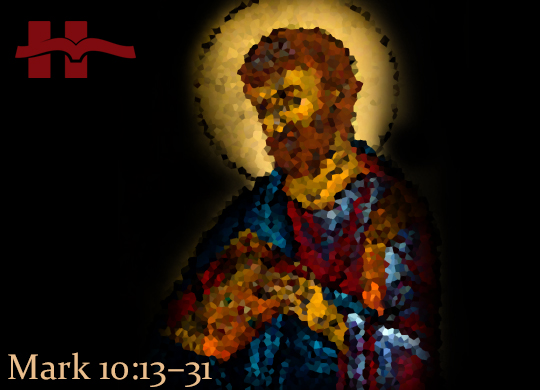Mark 10:13–31

Confident of the abundance of their rewards, disciples give freely of their possessions, humbly depending upon God.
“Sell all you have and give to the poor, and you will have treasure in heaven; and come, follow Me.”
Mark 9:35
This section opens with Jesus’ embrace of children (10:13–16). The characteristic of children that enables them to accept everything as a gift is what the disciple should demonstrate: receiving the kingdom with humility acknowledging total dependency on the grantor. The “kingdom of God” is possessed, received, and entered into (10:14, 15); all three deal with facets of discipleship, including the acceptance of Jesus’ suffering mission and the possession of rewards in the afterlife. That principle is illustrated vividly in the second episode of this section—the story of the rich man.
The “inheritance of eternal life” that the rich man is interested in (10:17) is likely to be equivalent to “entering the kingdom of God,” the reward element of the afterlife, the possession of its blessings (10:23, 24, 25). This would seem to indicate that all of those terms pertaining to the hereafter in Mark 10 primarily indicate future rewards for believers who have accepted (“received”) Jesus’ radical demands of discipleship in the present. The dialogue between the man and Jesus (10:17–21) results in an absolute demand from the latter: the former is to give up everything he has become a Christ-follower: “Go … whatever you have sell/give … and you will have treasure in heaven … come” (10:21). An exchange: give what you have to have treasure in heaven.
This was a difficult lesson for the rich man, as it is for any disciple with an overflow of material goods. With abundance of chattel, comes one’s trust and dependence upon that abundance, accompanied by a strong reluctance to relinquish that seemingly secure reservoir of plenty. It’s easy to place one’s hope on wealth.
But to receive the kingdom as a child is to receive it and its accompaniments depending solely upon the grace of God, the grantor of all good things, both here and in the hereafter. The problem is not necessarily possession of wealth; rather, it is the attachment to it. The making of money, the keeping of money, the protection of money, and the generation of even more money—all can be powerful distractions from the singular focus of discipleship that Jesus demands.
On the other hand, acceptance of Jesus’ mission of discipleship in this life—that includes persecution and suffering—will guarantee entrance into God’s kingdom with its rewards in the hereafter. Observe the explanatory interchange between the disciples and Jesus (10:24–27). This rich man is not viewed as an exceptional case; the universality and comprehensive nature of Jesus’ assertion is severe in its bluntness: it is virtually impossible for the rich to obtain the rewards of the kingdom.
But the good news is that a disciple who sacrifices will be amply recompensed (10:29–30). What exactly present compensation entails, Jesus does not specify but, one suspects that it is the new community of God, the body of Jesus’ disciples, that becomes the source of this recompense: notice the emphasis on members of the family (of God).
In short, the rich of this world (and “richness” is admittedly a matter of degree) must always be cautious. Dependence upon, and allegiance to, riches, may lead one to neglect the radical demands of discipleship and the call to follow Jesus on the way, resulting in a loss of rewards. So hold everything loosely!












 Abe Kuruvilla is the Carl E. Bates Professor of Christian Preaching at The Southern Baptist Theological Seminary (Louisville, KY), and a dermatologist in private practice. His passion is to explore, explain, and exemplify preaching.
Abe Kuruvilla is the Carl E. Bates Professor of Christian Preaching at The Southern Baptist Theological Seminary (Louisville, KY), and a dermatologist in private practice. His passion is to explore, explain, and exemplify preaching.